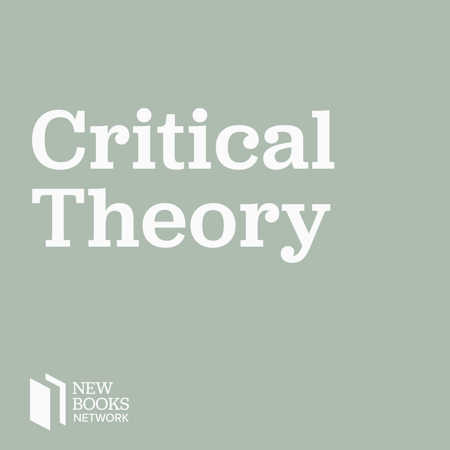
New Books in Critical Theory
Interviews with Scholars of Critical Theory about their New Books
1576
Khurram Hussain, "Islam as Critique: Sayyid Ahm...
Hussain explores ways in which Sayyid Ahmad Khan’s thought on profound questions of moral obligations, knowledge, Jihad, and time disrupts a politics of “either/or” ...
58 min
1577
Nadine El-Enany, "Bordering Britain: Law, Race ...
How can we understand the legacy of colonialism within contemporary society?
43 min
1578
Andrew Kettler, "The Smell of Slavery: Olfactor...
Kettler charts the impact that smell had on the making of race and justifications for enslavement in the Atlantic world....
51 min
1579
Marika Rose, "A Theology of Failure: Žižek Agai...
Rose argues that failure should be welcomed as a core element of Christian identity....
60 min
1580
Sasha Costanza-Chock, "Design Justice: Communit...
Design justice demands a deep understanding of the community and its needs, engagement with community members, and a recognition of their expertise, along with reciprocation of value....
34 min
1581
Justin Gomer, "White Balance: How Hollywood Sha...
Gomer illustrates the myriad of ways that Hollywood relied on and helped solidify an emerging ideology of colorblindness in the wake of the civil rights movement...
67 min
1582
Ari Linden, "Karl Kraus and The Discourse of Mo...
Linden analyzes Karl Kraus’s oeuvre while engaging in the conversation about modernism and modernity, which is shaped and conditioned by the already post-postmodern condition...
53 min
1583
Kevin Escudero, "Organizing While Undocumented:...
Undocumented youth activists are at the forefront of the present-day immigrant rights movement....
67 min
1584
Christina Dunbar-Hester, "Hacking Diversity: Th...
Dunbar-Hester investigates how open-technology communities are considering the question of diversity and inclusion.
34 min
1585
Raluca Soreanu, "Working-through Collective Wou...
Soreanu formulates a theory of collective trauma, drawing on the work of Sándor Ferenczi...
66 min
1586
Y. F. Niemann and G. Gutiérrez y Muhs, "Presume...
This book provides practical, specific, and insightful guidance to fight back, prevail, and thrive in challenging work environments...
78 min
1587
Martin Jay, "Splinters in Your Eye: Frankfurt S...
Jay provides ample evidence of the abiding relevance of Horkheimer, Adorno, Benjamin, Marcuse, Löwenthal, and Kracauer in our troubled times...
86 min
1588
Jonathan Sklar, "Dark Times: Psychoanalytic Per...
In between this psychoanalytically informed reading of history, politics and their relation to the individual psyche, Sklar leaves room for applying the analysis of the histories of trauma and mourning...
50 min
1589
Lizzie O’Shea, "Future Histories" (Verso, 2019)
When we talk about technology we always talk about the future—which makes it hard to figure out how to get there...
68 min
1590
Adrian Johnston, "Prolegomena to Any Future Mat...
This volume takes Hegel as its key point of reference...
95 min
1591
Crystal Mun-hye Baik, "Reencounters: On the Kor...
This interview coincides with the 70th anniversary of the Korean War, a war that, as Baik reminds us, has not officially ended...
76 min
1592
Mia Fischer, "Terrorizing Gender: Transgender V...
Mia Fischer traces how media and state actors collude in the violent disciplining of trans women...
50 min
1593
Marianna Ritchey, "Composing Capital: Classical...
What is the place of classical music in contemporary society?
47 min
1594
Greg Burris, "The Palestinian Idea: Film, Media...
Is there a link between the colonization of Palestinian lands and the enclosing of Palestinian minds?
64 min
1595
Evan Smith, "No Platform: A History of Anti-Fas...
The tactic of ‘no platforming’ has been used at British universities and colleges since the National Union of Students adopted the policy in the mid-1970s...
70 min
1596
How Neoliberalization Has Increased Social, Eco...
An interview with Cory Blad
16 min
1597
Ali Meghji, "Black Middle-Class Britannia: Iden...
Maghji considers the identity of Britain’s Black middle-class by understanding culture and cultural consumption...
32 min
1598
Tsedale Melaku, "You Don’t Look Like a Lawyer: ...
What kind of discrimination do Black women face in the legal profession?
49 min
1599
Josh Cerretti, "Abuses of the Erotic: Militariz...
Cerretti argue that a project of militarizing sexuality succeeded in the 1990s United States...
58 min
1600
Mariann Hardey, "The Culture of Women in Tech: ...
What is the culture of the tech industry?
40 min